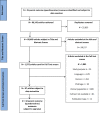Psychometric Properties of Parent Outcome Measures Used in RCTs of Antenatal and Early Years Parent Programs: A Systematic Review
- PMID: 30796674
- PMCID: PMC6669247
- DOI: 10.1007/s10567-019-00276-2
Psychometric Properties of Parent Outcome Measures Used in RCTs of Antenatal and Early Years Parent Programs: A Systematic Review
Abstract
Parenting programs are effective in the early intervention and treatment of children's social, emotional and behavioural difficulties. However, inconsistency in the use of outcome measures limits the comparability of programs and creates challenges for practitioners seeking to monitor progress of families in their care. A systematic review was conducted to identify measures, appraise their psychometric properties and ease of implementation, with the overall objective of recommending a small battery of measures for use by researchers and practitioners. This article provides an overview of the most commonly used measures in experimental evaluations of parenting programs delivered to parents of children up to, and including, the age of 5 years (including antenatal programs). An in-depth appraisal of the psychometric properties and ease of implementation of parent outcome measures is also presented (findings in relation to child and dyadic outcome measures are presented elsewhere). Following a systematic search, 64 measures were identified as being used in three or more of 279 included evaluation studies. Data on the psychometric properties of 18 parent outcome measures were synthesised from 87 development and validation studies. Whilst it was not possible to identify a definitive battery of recommended measures, we are able to recommend specific measures that could be prioritised in further research and development and hold promise for those seeking to monitor the outcomes of parents and children in receipt of parenting programs.
Keywords: COSMIN; Outcome measures; Parenting; Psychometric properties; Systematic review.
Conflict of interest statement
The authors declare that they have no conflict of interest.
Figures
Similar articles
-
Psychometric Properties of Child (0-5 Years) Outcome Measures as used in Randomized Controlled Trials of Parent Programs: A Systematic Review.Clin Child Fam Psychol Rev. 2019 Sep;22(3):388-405. doi: 10.1007/s10567-019-00277-1. Clin Child Fam Psychol Rev. 2019. PMID: 30806864 Free PMC article.
-
The impact of early-years provision in Children's Centres (EPICC) on child cognitive and socio-emotional development: study protocol for a randomised controlled trial.Trials. 2018 Aug 22;19(1):450. doi: 10.1186/s13063-018-2700-x. Trials. 2018. PMID: 30134990 Free PMC article. Clinical Trial.
-
Psychometric Properties of Parent-Child (0-5 years) Interaction Outcome Measures as Used in Randomized Controlled Trials of Parent Programs: A Systematic Review.Clin Child Fam Psychol Rev. 2019 Jun;22(2):253-271. doi: 10.1007/s10567-019-00275-3. Clin Child Fam Psychol Rev. 2019. PMID: 30734193 Free PMC article.
-
An Open Trial of Parent-Child Care (PC-CARE)-A 6-Week Dyadic Parenting Intervention for Children with Externalizing Behavior Problems.Child Psychiatry Hum Dev. 2019 Feb;50(1):1-12. doi: 10.1007/s10578-018-0814-8. Child Psychiatry Hum Dev. 2019. PMID: 29855819
-
A pilot effectiveness study of the Enhancing Parenting Skills (EPaS) 2014 programme for parents of children with behaviour problems: study protocol for a randomised controlled trial.Trials. 2015 May 20;16:221. doi: 10.1186/s13063-015-0741-y. Trials. 2015. PMID: 25986699 Free PMC article. Clinical Trial.
Cited by
-
Parent mental health and family functioning following diagnosis of CHD: a research agenda and recommendations from the Cardiac Neurodevelopmental Outcome Collaborative.Cardiol Young. 2021 Jun;31(6):900-914. doi: 10.1017/S1047951121002134. Epub 2021 Jun 4. Cardiol Young. 2021. PMID: 34082841 Free PMC article.
-
A randomized controlled trial of a proportionate universal parenting program delivery model (E-SEE Steps) to enhance child social-emotional wellbeing.PLoS One. 2022 Apr 4;17(4):e0265200. doi: 10.1371/journal.pone.0265200. eCollection 2022. PLoS One. 2022. PMID: 35377882 Free PMC article. Clinical Trial.
-
Different Instruments, Same Content? A Systematic Comparison of Child Maltreatment and Harsh Parenting Instruments.Trauma Violence Abuse. 2023 Dec;24(5):3546-3563. doi: 10.1177/15248380221134290. Epub 2022 Nov 28. Trauma Violence Abuse. 2023. PMID: 36437787 Free PMC article. Review.
-
Determinant Factors of Alcohol Consumption Among Indonesian Adolescents Through Parents' Attention: Findings from a National Survey.Florence Nightingale J Nurs. 2022 Oct;30(3):238-244. doi: 10.5152/FNJN.2022.22002. Florence Nightingale J Nurs. 2022. PMID: 36106805 Free PMC article.
-
The Measurement Properties and Acceptability of a New Parent-Infant Bonding Tool ('Me and My Baby') for Use in United Kingdom Universal Healthcare Settings: A Psychometric, Cross-Sectional Study.Front Psychol. 2022 Feb 14;13:804885. doi: 10.3389/fpsyg.2022.804885. eCollection 2022. Front Psychol. 2022. PMID: 35237212 Free PMC article.
References
-
- Abidin R. Parenting Stress Index (3rd Ed): Professional manual. Lutz: Psychological Assessment Resources; 1995.
-
- Abubakar A, Fischer R. The factor structure of the 12-item General Health Questionnaire in a literate Kenyan population. Stress and Health. 2012;28:248–254. - PubMed
-
- Arney F, Rogers H, Baghurst P, Sawyer M, Prior M. The reliability and validity of the Parenting Scale for Australian mothers of preschool-aged children. Australian Journal of Psychology. 2008;60:44–52.
-
- Arnold DS, O’Leary SG, Wolff LS, Acker MM. The Parenting Scale: A measure of dysfunctional parenting in discipline situations. Psychological Assessment. 1993;5:137–144.
Publication types
MeSH terms
Grants and funding
LinkOut - more resources
Full Text Sources
Medical



